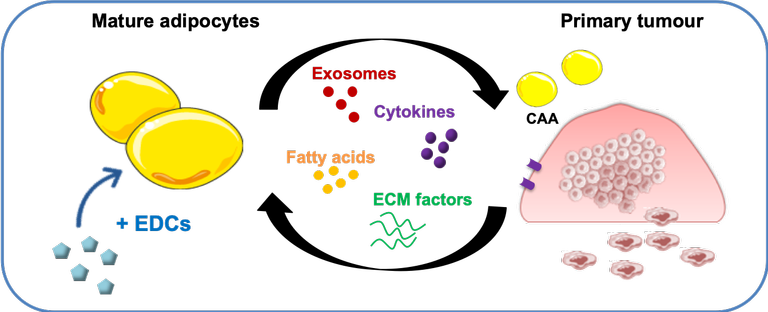Academy of Excellence "Territories, Environments, Risks and Resilience"
Impact of Endocrine Disrupting Compounds on Adipose Tissue Secretome and on Aggressiveness of Prostate Cancer

Academy 3 highlight
ProstAdiPE gathers experts on hormone-dependent cancers, adipose tissue biology, and organic pollutants to investigate the human health risks posed by certain anthropogenic pollution compounds, the endocrine-disrupting chemicals. It specifically examines the possible causal relationship between these compounds and hormone-sensitive cancers, such as prostate cancer.
The project
Persistent organic pollutants are lipophilic chemicals that are present in many industrial products and accumulate throughout the food chain. From fetal life to adulthood we are chronically exposed to these pollutants. Some of them, called endocrine disrupting chemicals (EDCs), have been shown to interfere with the body’s endocrine system and produce adverse effects by modifying hormone regulation. In particular, EDCs seem to be implicated in the increased occurrence of some hormone-dependent cancers, including prostate cancers.
Due to their specific chemical structure, EDCs are not metabolizable and they thus accumulate in human adipose tissue. Doing so, they progressively make the adipose tissue a persistent internal source of systemic chronic exposure to EDCs. On the other hand, excess adiposity in obesity increases the risk of cancer development. In many tumors, the cells that form adipose tissue (adipocytes) are in close contact with the cancer cells. While adipocytes usually secrete various substances known as the “secretome” (which includes fatty acids, cytokines, exosomes, etc.), their secretion is modified in peri-tumoral adipose tissue. Moreover, the modified secretome seems to favor tumor growth.
We hypothesize here that exposure to EDCs contributes to modify the secretome of peri-tumoral adipose tissue in case of prostate cancer. To examine this hypothesis, we are investigating: 1) the EDC storage and release capacity of human adipocytes; 2) how EDCs modify the secretome of human adipocytes; 3) whether the modified adipocyte secretome influences the aggressiveness of prostate cancer tumoral cells.
To address these questions, we use human adipocytes (differentiated adipose-derived multipotent stem cells) and human prostate cells affected by cancer (carcinoma type), and put them in contact with different EDCs. Our preliminary results show that one of the EDCs is stored in the adipocytes in less than 24h, after one or more nanomolar doses. In the case of two EDCs, we observe increased prostate cancer cell proliferation when the cells are incubated with the supernatant from EDC pretreated adipocytes (conditioned media). We are in the process of analyzing the adipocyte secretome to identify how it has been modified. So far, we have shown that neither of the two EDCs modified fatty acid release by the adipocytes. Therefore, the EDC-induced secretome changes are to be found in other substances.
The +
In contrast to most projects that have investigated the impact of high doses of EDC on cancer, our study is one of the first to focus on low doses of EDC. If successful, our project could allow for the identification of biomarkers in adipose tissues associated with exposure to EDC.
What’s next?
Should biomarkers of exposure to low doses of EDC be identified, biological samples could be assessed for these biomarkers on a large scale in routine clinical settings. We will apply for additional funding from ANSES and the ANR to undertake the subsequent proof-of-concept studies.
Project information
|
Scientific domain
Environment and health Theme Persistent Organic Pollutants
|
Key words
Endocrine disrupting chemicals
Low dose
Chronic exposure
Adipose tissue
Prostate cancer
|
|
Total budget
20 k€ including :
10 k€ from Académie 3 to initiate the project in addition to 10 k€ from ITMO Cancer and ANSES grants |
Students inolved
Bastien Dolfi, Master 1 2018-2019 |
| Partner laboratories
Ez Zoubir Amri, Team "Cellular and molecular regulation of fat mass"
- iBV CNRS UMR 7277 - INSERM U1091 - Université Côte d'Azur Hélène Loiacono et Jean Lafay, Organic pollutants sector from
Sustainable Development Observatory of the Metropolis Nice Cote d'Azur. |
Project members
Bastien Dolfi, Master 1
Stephan Clavel, MCU,
Nicolas Chevalier, PU-PH,
Frédéric Bost DR,
Charlotte Hinault, MCU-PH,
|

Charlotte Hinault
Project valorization
- "Low doses of persistent organic pollutants increase the tumor aggressiveness of hormone-dependent cancer cells " ECE 2019 May LYON, poster
- "Impact of endocrine disrupting compounds on the proliferation of prostate cancer cells and on the adipocyte secretome" Canceropole 2019 July, Poster

















